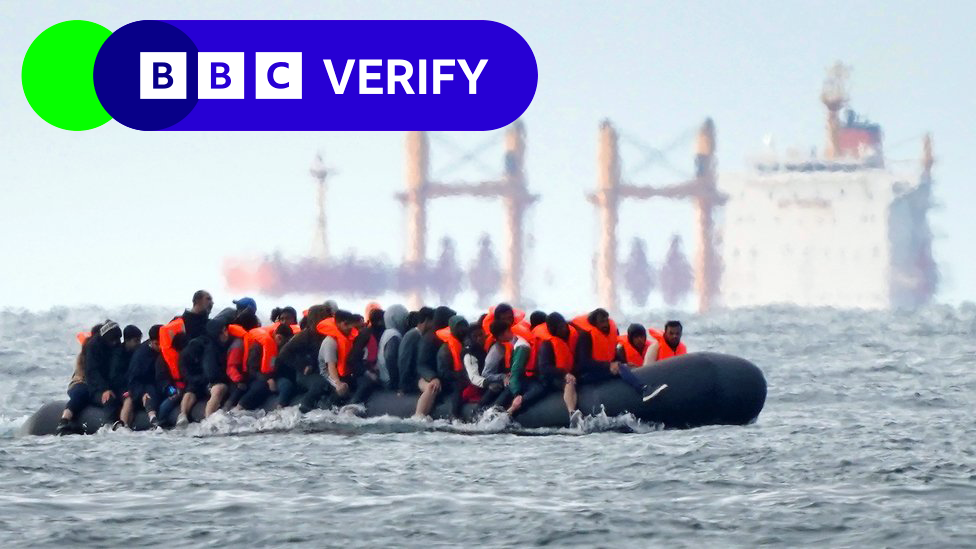1 hour ago
About sharing
New figures obtained by BBC Verify have raised questions about the government’s claims that poor weather conditions had no impact on a fall in small boat crossings across the Channel.
The number of successful crossings by migrants decreased by a third in 2023.
The government later ruled out weather conditions as a reason for the fall.
But a Met Office report for UK Border Force suggests there were more days in 2023 than in 2022 when migrants were unlikely to cross due to the weather.
The number of migrants crossing the Channel fell by about 36% last year – falling from 45,774 in 2022, to 29,437 in 2023.
Last month, Home Secretary James Cleverly told BBC Breakfast that weather was not a “contributory factor” to falling numbers of migrants crossing the Channel.
He said the decrease was instead down to greater co-operation with Europe and “going after” people smugglers.
BBC Verify has now obtained official weather reports given to UK Border Force, following a Freedom of Information request.
The reports were prepared by the Met Office, and assessed how likely migrant crossings were to happen in the Channel for every day of 2022 and 2023.
Experts assessed a range of weather conditions, such as wave height and temperature, and each day was then categorised by how favourable Channel conditions were for migrants looking to make a crossing.
The categories ranged from “highly unlikely” – meaning Met Office officials considered sea conditions to be poor – to “highly likely”.
The report reveals the number of days with the very worst conditions to make a crossing on, called “highly unlikely”, increased by about 50% in 2023. Arrivals on these days were very low, at about three people a day on average.
The number of “highly likely” days fell by a quarter – these days saw an average of 248 people crossing.
Speaking to BBC Breakfast on 2 January, Mr Cleverly said there were 102 “good sailing days” in 2023, compared with 106 the previous year.
The official report shows Mr Cleverly combined the number of “likely” and “high likely” days over each year. However, that number does not factor in any change in the number of unlikely, or highly unlikely days.
In October 2023, former Immigration Minister Robert Jenrick also claimed weather conditions “were more favourable to small boat crossings than those in 2022”.
Peter Walsh, senior researcher at Oxford University’s Migration Observatory, told the BBC the new figures suggested weather was certainly ‘a factor’.
However, he added: “The importance of weather as a factor is unknown, and is difficult to disentangle from a whole range of other factors that could be driving small boat arrivals.”
Other potential influences include the conditions in the countries where people travel from, including places like Afghanistan or Albania, the time it takes people to get to crossing points, as well as enforcement activity by France and Belgium.
Mr Cleverly linked the decrease in migrant crossings to co-operation with countries such as France and Albania, and the government’s efforts to disrupt the supply chains and finances of criminal gangs.
A Home Office spokesperson said it would be “simply wrong” to say the fall in crossings was down to poor weather, adding: “Our relentless action reduced crossings by 36% last year, which saw similar weather conditions to 2022, and while crossings were up by 80% in Europe.”
But Lucy Moreton, from the ISU, a union representing border force officials, said it was “difficult, if not impossible” to say there was a precise cause of the reduction in migrant numbers last year.
“The statistics bear out that the weather has limited crossings in 2023,” she said. “It is true that the weather conditions for crossing were less favourable leading to fewer crossing days.
“It is also true that the French, funded by the UK government, have been more effective in their efforts to prevent boats setting to sea.”
As well as successful crossings, the number of attempted border-crossing to the UK on small boats also fell last year. In 2023, about 62,000 attempts were made, down from 70,000, according to Frontex, the EU border agency.
Additional reporting by Lucy Gilder and Nick Eardley
